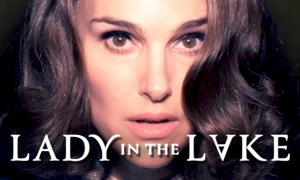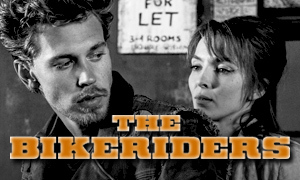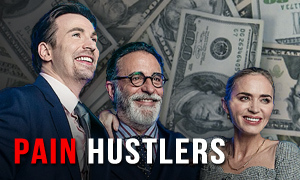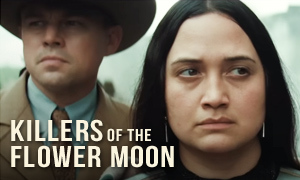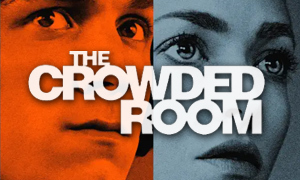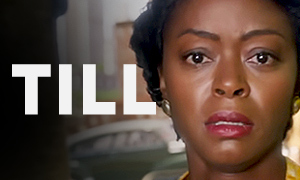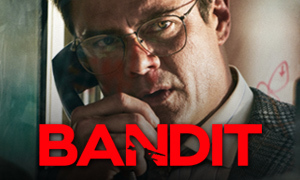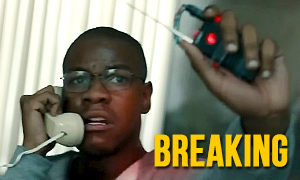Molly's Game: History vs. Hollywood
| REEL FACE: | REAL FACE: |
Jessica Chastain
Born: March 24, 1977 Birthplace: Sacramento, California, USA | Molly Bloom
Born: April 21, 1978 Birthplace: Loveland, Colorado, USA |
Kevin Costner
Born: January 18, 1955 Birthplace: Lynwood, California, USA | Larry Bloom
Born: abt 1939 Birthplace: USA |
Michael Cera
Born: June 7, 1988 Birthplace: Brampton, Ontario, Canada | Tobey Maguire
Born: June 27, 1975 Birthplace: Santa Monica, California, USA Renamed "Player X" in the movie |
Jeremy Strong
Born: December 25, 1978 Birthplace: Boston, Massachusetts, USA | Darin Feinstein
Born: January 5, 1972 Birthplace: Los Angeles, California, USA Renamed "Dean Keith" in the movie |
Was Molly Bloom really a professional skier?
Yes. The Molly's Game true story reveals that, like in the movie, former freestyle mogul skier Molly Bloom had never made it to the Olympics, in part due to an injury. "I was on the U.S. Ski Team," Bloom said during an interview on Ellen. "I was third in North America, and I crashed pretty horrifically on my Olympic qualifying run." With skiing out of the picture, Molly still felt a great deal of pressure to be successful. Her brother, Jeremy Bloom, was a two-time Olympian freestyle skier who was also a professional football player for the Philadelphia Eagles and Pittsburgh Steelers. Her other brother is a surgeon who graduated from Harvard Medical School. To learn more about her injury and time as a professional skier, read her book, Molly's Game: The True Story of the 26-Year-Old Woman Behind the Most Exclusive, High-Stakes Underground Poker Game in the World.
How did Molly Bloom become involved in the world of high-stakes poker?
While taking the year off between undergrad and presumably law school, Molly went to LA in 2003 and began working a number of different jobs, including as a cocktail waitress and an executive assistant to real estate entrepreneur Darin Feinstein, one of the co-owners of the Hollywood nightclub The Viper Room (renamed The Cobra Lounge in the movie). One day Feinstein told her, "I'm going to need you to help me run this poker game." Molly went home and started Googling, "What kind of music do poker players like to listen to?" and "What do they eat?"
"I made this mix CD with 'The Gambler' on it and other really clichéd songs," says Molly, "and I had a cheese plate, and my cutest outfit, and I walked into this room and it was incredible. I recognized in that instant that this is not an opportunity that a girl from a small town in Colorado gets. There were Wall Street titans. There were billionaires. There were A-list actors, the most famous people we see on television, politicians, and they're all seated around this table playing this game that I didn't know what it was, but it seemed to be super compelling to them." -Ellen
Is The Cobra Lounge a real nightclub?
No. In answering the question, "How accurate is Molly's Game?" we learned that the real nightclub where the poker games initially took place was The Viper Room on the Sunset Strip in West Hollywood. The club had been partly owned by Johnny Depp from its opening in 1993 until 2004. It was a popular celebrity hangout and is famous for being the location where actor River Phoenix died of a drug overdose on Halloween morning in 1993.
Did Molly Bloom really get $3,000 in tips on her first night helping out with her boss's poker game?
Yes. The $3,000 in tips comes straight from her memoir. The money helped inspire her to fully embrace the world of underground poker. Like in the film, she tried to learn as much as she could about poker through internet and personal research.
Was Molly's boss really an unpleasant man?
Yes, at least that's what she states in her book Molly's Game. Portrayed by Jeremy Strong in the Molly's Game movie and referred to as Reardon Green in the book, Molly's boss, Darin Feinstein, wasn't the most pleasant of men. The scene in the movie when he yells at Molly (Jessica Chastain) for buying "poor people bagels" is real, according to her memoir.
Was the real Molly Bloom involved in the making of the movie?
Yes. Screenwriter/director Aaron Sorkin consulted Molly throughout the screenwriting process. He also relied heavily on her memoir of the same name (pictured below). -TIME
How did Molly end up starting her own poker game?
Like in the movie, her boss fired her from his game, so she decided to utilize the contacts she made to start up a poker game of her own.
How much was the buy-in to get into Molly's poker games?
In researching the Molly's Game true story, we learned that initially the buy-in started at $10,000. "Ultimately, it got to $250,000," Molly Bloom said during an interview on Ellen. She became known as the "Poker Princess."
Who were some of the celebrities who played in Molly Bloom's poker games?
Molly ran two underground games that attracted some of Hollywood's biggest stars, including Leonardo DiCaprio, Tobey Maguire, Ben Affleck, Matt Damon, Macaulay Culkin, Alex Rodriguez, Pete Sampras and others. In her book, Bloom only mentions the celebrities who had already been outed in the media prior to the book being published. She stayed silent on the others, protecting their identities.
What's the most that Molly Bloom saw someone lose in a single night?
"I saw someone lose $100 million in a night," says Bloom, "and he paid the next day." -Ellen
Did a mobster really put a gun to Molly's head?
Yes. This is in Bloom's memoir. Like in the movie, she had hired a driver for security reasons. He introduced her to some of his mobster friends. They offered her protection for a slice of her profits. When she refused, a man showed up at her door with a gun. He roughed her up and threatened her family. He made off with her cash and jewelry, telling her that he had been sent by the mobsters. She was to be contacted about setting up a meeting but it never happened. Bloom read in the newspaper that the FBI had arrested close to 125 individuals in a large-scale mob roundup.
Is Idris Elba's character, Charlie Jaffey, based on a real person?
No. Obviously Molly Bloom did hire lawyers, but Charlie Jaffey is a fictional character. When writing the screenplay, Aaron Sorkin did not interview Bloom's real-life lawyer, Jim Walden (pictured below, right). Sorkin said he wanted to be able to fictionalize the character to best serve the story and not have to worry about keeping him historically accurate. However, Bloom says that, similar to the film, her criminal attorney, Jim Walden, did vouch for her for $250,000 that she didn't have. "It saved my butt," says Bloom. -Vice
Did Molly Bloom become addicted to drugs?
Yes. In researching how accurate Molly's Game is, we discovered that as the game began to get out of control, so did Molly's life. She ended up addicted to drugs. Her poker customers came to include men from the Russian mob. She often found herself being stiffed cash she was owed. This prompted her to take a percentage of the pot in order to operate as the bank, a move that caught the attention of the Feds. -People
What was the worst that Molly got stiffed?
"The very worst time I got screwed ended up costing me $250,000, and that really hurt," says Molly. "But I wrote the check—what are you going to do?" She says that she wasn't willing to resort to violence in order to collect, and if she was vetting the players properly, she wouldn't have to worry about not getting paid. -Vice
How did Molly Bloom get busted by the FBI?
"The trajectory that I started out, from serving people drinks, then I became a game runner and operator, and then, ultimately, I became the bank," Molly explained. "So I was extending credit to these guys. I was essentially loaning them money, guaranteeing that money. I had to figure out - I had to do background checks and vet them to see if they were good for it. And I was getting stiffed a lot. I had to write big checks for people that didn't pay. So I started taking a percentage of the pot like Vegas does. And that was when I crossed over and broke a federal law."
"The feds first found out about it because a guy [hedge fund manager Bradley Ruderman] in my LA game was running a Ponzi scheme. He lost $5 million [of his investors' money] in the game and they came after all of us. That's how the celebrities got outed. That's how they found out about this game. And then, the feds started secretly following me and listening to our conversations." This is pretty much exactly how it unfolds in the movie. -Ellen
In 2011, the group of hedge fund investors who had been taken in Bradley Ruderman's Ponzi scheme ended up suing Tobey Maguire and other celebrities. The investors claimed the celebrities had won cash from Ruderman that belonged to them. -Business Insider
Is Michael Cera's "Player X" character based on a real person?
It's somewhat obvious that "Player X" represents Tobey Maguire, who plays the biggest part in Bloom's memoir, but there's not an exact one-to-one correlation between the two. Writer/director Aaron Sorkin even gives a nod to the Spider-Man actor at one point, with a line about "Player X" portraying a superhero. According to the true story, another actor took control of the weekly game, and Bloom writes that Maguire was the one who called her and giddily informed her that she had lost the game, as "Player X" does in the movie.
In real life, Bloom wrote in her memoir that Tobey Maguire once offered her a $1,000 tip to bark like a seal that wants a fish and then stormed off when she refused. This seems to be in line with the tasteless persona of "Player X" in the Molly's Game movie. Bloom also wrote that Maguire "was the worst tipper, the best player, and the absolute worst loser."
Did Molly's mom put her house up to help her pay her legal bills?
Yes. "I had left a huge mess of my life," says Molly. A big part of that was knowing that her mother had put her house up to help her pay her bail and legal fees. Her mother's sacrifice helped inspire her to write the book. "When I took in the personal inventory after the wreckage I had caused, the story itself seemed like the most monetizing asset so that I could be closer to paying these people back." After writing the book, she went around Hollywood trying to find a way to get a meeting with Aaron Sorkin. Her persistence paid off. They met and he was onboard for turning her story into a film. -Vice
What was Molly Bloom's punishment?
In 2014, Bloom, who was 36 at the time, was cleared of a number of the charges she was facing and was sentenced to one year probation, 200 hours of community service, and a $1,000 fine. At the sentencing, her lawyer, Jim Walden, conveyed to the court that Bloom was in severe debt in part due to giving up $125,000 in poker profits as part of her plea. -USA Today
What is Molly Bloom doing today?
Molly is using her networking experience to reach fellow women and help them become successful. "I have a network, and I have a lot of lessons," says Molly. "I made a lot of mistakes. So I want to help women to be successful." She's working on developing localized co-working spaces for women in an effort to build community. She's also working in social media to that end as well. -Ellen
Molly Bloom Interview & Related Videos
Expand your knowledge of the Molly's Game true story by watching the Molly Bloom interview below.
Link-to-Learn More:
